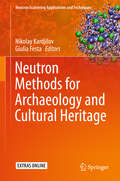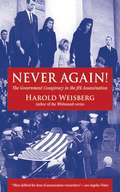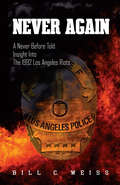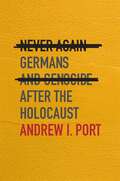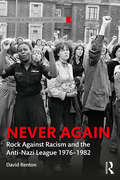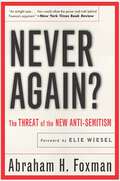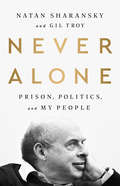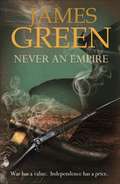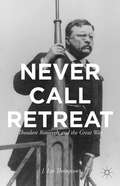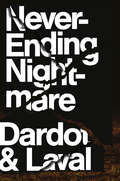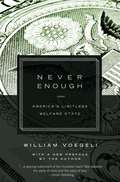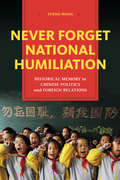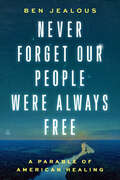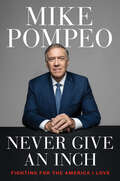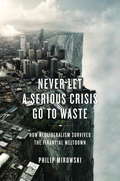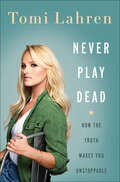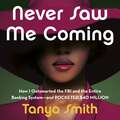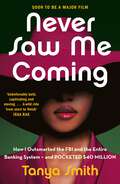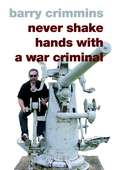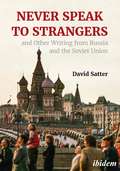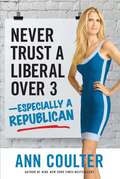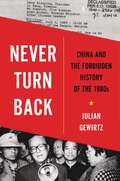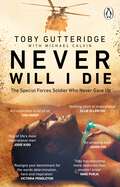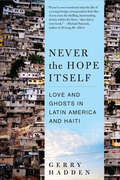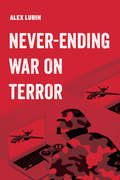- Table View
- List View
Neutron Methods for Archaeology and Cultural Heritage
by Nikolay Kardjilov Giulia FestaThis book provides an extensive overview of the application of neutron characterization techniques in cultural heritage to a broad audience and will be of interest to both scientists and non-scientists in the field. Archeologists, paleontologists, restaurateurs and conservators, historians and collectors will be fascinated by the wealth of information that can be obtained using neutron techniques, while material scientists and engineers will find details of the experimental techniques and materials properties that can be determined. Neutrons, due to their weak interactions with materials, provide a penetrating, but non-invasive probe of bulk properties. They allow the characterization of the composition and mechanical properties of materials, helping to answer questions related to the dating, the manufacturing process or the state of degradation of artefacts. They allow detailed interrogation of the internal structures of objects that may be otherwise hidden from view. The first section of the book is dedicated to stories describing spectacular discoveries brought about by the use of neutron techniques in a range of applications. The second section covers the experimental techniques in appropriate detail: basic principles, limitations and fields of application.
Never Again!: The Government Conspiracy in the JFK Assassination
by Harold WeisbergOriginally published in 1995, and in the same classic investigative style of Whitewash and Case Open, Harold Weisberg turns his sharp investigative eye towards the events surrounding the autopsy of John F. Kennedy. Inside Never Again! you'll find: The specific truths regarding the autopsy of John F. Kennedy--truths that have for thirty years been buried, distorted, or ignored not only by the government but also by the national press The blatant errors and calculated deceit of the Journal of the American Medical Association in their 1992 reports on the Kennedy autopsy The path of conspiracy leading from the Navy Hospital in Bethesda through the corridors of the FBI to the Justice Department, into the office of the attorney general and eventually that of the presidentWeisberg argues this case with exclusive regard for the facts. Facts lead to the book's startling new illuminations. Facts provide a compelling narrative filled with intrigue and laced with outrage. Facts reveal the failure of America's institutions to deal effectively with perhaps its most profound national tragedy. In the face of overwhelming facts, Harold Weisberg justly warns us that this must never again happen!
Never Again: A Never Before Told Insight into the 1992 Los Angeles Riots
by Bill C. WeissNever Again offers first hand insight into the hours leading up to, during, and after the Los Angeles riots, telling detail by detail how closely the L.A. County Sheriff’s Department was to changing the course of history. The L.A. Police Department is thrust into the limelight and finds itself totally unprepared to deal with this deadly and dynamic crisis. Bill Weiss, the Watch Commander, copes with his internal instinct to take action, waged against his self-discipline to follow orders, leading up to the final moment when he is ready to put his daring plan into action. This chaotic and rapidly evolving disturbance engulfed the city and portions of the surrounding metropolitan area. Its effect would be felt throughout the nation and observed throughout the world. Many of the scars still remains today, and something lost still lingers within Weiss as he tries to come to terms with what could have been.
Never Again: Germans and Genocide after the Holocaust
by Andrew I. PortGermans remember the Nazi past so that it may never happen again. But how has the abstract vow to remember translated into concrete action to prevent new genocides abroad?As reports of mass killings in Bosnia spread in the middle of 1995, Germans faced a dilemma. Should the Federal Republic deploy its military to the Balkans to prevent a genocide, or would departing from postwar Germany’s pacifist tradition open the door to renewed militarism? In short, when Germans said “never again,” did they mean “never again Auschwitz” or “never again war”?Looking beyond solemn statements and well-meant monuments, Andrew I. Port examines how the Nazi past shaped German responses to the genocides in Cambodia, Bosnia, and Rwanda—and further, how these foreign atrocities recast Germans’ understanding of their own horrific history. In the late 1970s, the reign of the Khmer Rouge received relatively little attention from a firmly antiwar public that was just “discovering” the Holocaust. By the 1990s, the genocide of the Jews was squarely at the center of German identity, a tectonic shift that inspired greater involvement in Bosnia and, to a lesser extent, Rwanda. Germany’s increased willingness to use force in defense of others reflected the enthusiastic embrace of human rights by public officials and ordinary citizens. At the same time, conservatives welcomed the opportunity for a more active international role involving military might—to the chagrin of pacifists and progressives at home.Making the lessons, limits, and liabilities of politics driven by memories of a troubled history harrowingly clear, Never Again is a story with deep resonance for any country confronting a dark past.
Never Again: Rock Against Racism and the Anti-Nazi League 1976-1982 (Routledge Studies in Fascism and the Far Right)
by David RentonBy 1976, the National Front had become the fourth largest party in Britain. In a context of national decline, racism and fears that the country was collapsing into social unrest, the Front won 19 per cent of the vote in elections in Leicester and 100,000 votes in London. In response, an anti-fascist campaign was born, which combined mass action to deprive the Front of public platforms with a mass cultural movement. Rock Against Racism brought punk and reggae bands together as a weapon against the right. At Lewisham in August 1977, fighting between the far right and its opponents saw two hundred people arrested and fifty policemen injured. The press urged the state to ban two rival sets of dangerous extremists. But as the papers took sides, so did many others who determined to oppose the Front. Through the Anti-Nazi League hundreds of thousands of people painted out racist graffiti, distributed leaflets and persuaded those around them to vote against the right. This combined movement was one of the biggest mass campaigns that Britain has ever seen. This book tells the story of the National Front and the campaign which stopped it.
Never Again?: The Threat of the New Anti-Semitism
by Abraham H. FoxmanThe ongoing war on terror, instability in the Middle East, and a faltering world economy are capturing headlines everywhere. But through it all runs a disturbing current of which many people are only dimly aware.Anti-Semitism, which had been on the decline worldwide since the end of World War II, has over the past few years made a perilous return. How could the twenty-first century -- the new millennium launched with such optimism just a few short years ago -- have so quickly been marred by the emergence of age-old hatreds, now armed with the powers of global terrorism?As national director of the Anti-Defamation League, Abraham H. Foxman fights against the menace of intolerance every day. As a result of the disturbing events of the last few years, he is convinced that we currently face as great a threat to the safety and security of the Jewish people as we faced in the 1930s. Foxman writes: "Within living memory, we’ve seen what can happen when a nation or a continent experiences an unrestrained outbreak of anti-Semitism. The Jews of the world -- and all people of goodwill who share their desire for a just and free society -- learned a series of critical lessons from the tragic history of the twentieth century. Today, we understand how important it is to recognize the emergence of new forms of anti-Semitism so that we can warn the world and stave off the worst effects."Anti-Semitism remains a pernicious form of ethnic and religious intolerance, with consequences for all of humankind. In communities from the United States to the Middle East, Europe to South Africa and Latin America, Jews are being persecuted in old and new ways. Exploring the history of anti-Semitism and providing the first comprehensive examination of the new rampant anti-Jewish sentiment worldwide, Never Again?? offers a crucial discussion of the steps that must be taken to prevent this century from witnessing a replay of the horrors of the last.
Never Alone: Prison, Politics, and My People
by Gil Troy Natan SharanskyA classic account of courage, integrity, and most of all, belongingIn 1977, Natan Sharansky, a leading activist in the democratic dissident movement in the Soviet Union and the movement for free Jewish emigration, was arrested by the KGB. He spent nine years as a political prisoner, convicted of treason against the state. Every day, Sharansky fought for individual freedom in the face of overt tyranny, a struggle that would come to define the rest of his life.Never Alone reveals how Sharansky's years in prison, many spent in harsh solitary confinement, prepared him for a very public life after his release. As an Israeli politician and the head of the Jewish Agency, Sharansky brought extraordinary moral clarity and uncompromising, often uncomfortable, honesty. His storyis suffused with reflections from his time as a political prisoner, from his seat at the table as history unfolded in Israel and the Middle East, and from his passionate efforts to unite the Jewish people.Written with frankness, affection, and humor, the book offers us profound insights from a man who embraced the essential human struggle: to find his own voice, his own faith, and the people to whom he could belong.
Never An Empire: Agents of Independence Series (Agents Of Independence Ser. #4)
by James GreenAs the 19th century draws to a close America is at war – a circulation war! In New York the two great leaders of the Yellow Press, William Randolph Hearst and Joseph Pulitzer, have gone head to head and nothing sells papers like a real war. Such is the power of the press that they get one. American victory over Spain brings its prizes: Cuba, Puerto Rico, Guam, and the Philippines. But in the Philippines a rebel army is already fighting for independence, but the Land of the Free doesn’t want to grant them their wish …Fourth in James Green’s successful Agents of Independence series, tracing the development of the American Secret Service.
Never Call Retreat
by J. Lee ThompsonThe first modern account of Theodore Roosevelt and the First World War, this is a tale of war and politics as well as the private story of true love and family devotion: a story as multi-faceted as TR's own personality.
Never Ending Nightmare: How Neoliberalism Dismantles Democracy
by Christian Laval Pierre DardotNeoliberalism's war against democracy and how to resist itHow do we explain the strange survival of the forces responsible for the 2008 economic crisis, one of the worst since 1929? How do we explain the fact that neoliberalism has emerged from the crisis strengthened? When it broke, a number of the most prominent economists hastened to announce the 'death' of neoliberalism. They regarded the pursuit of neoliberal policy as the fruit of dogmatism.For Pierre Dardot and Christian Laval, neoliberalism is no mere dogma. Supported by powerful oligarchies, it is a veritable politico-institutional system that obeys a logic of self-reinforcement. Far from representing a break, crisis has become a formidably effective mode of government.In showing how this system crystallized and solidified, the book explains that the neoliberal straitjacket has succeeded in preventing any course correction by progressively deactivating democracy. Increasing the disarray and demobilization, the so-called 'governmental' Left has actively helped strengthen this oligarchical logic. The latter could lead to a definitive exit from democracy in favour of expertocratic governance, free of any control.However, nothing has been decided yet. The revival of democratic activity, which we see emerging in the political movements and experiments of recent years, is a sign that the political confrontation with the neoliberal system and the oligarchical bloc has already begun.
Never Enough
by William VoegeliSince the beginning of the New Deal, American liberals have insisted that the government must do more-much more-to help the poor, to increase economic security, to promote social justice and solidarity, to reduce inequality, and to mitigate the harshness of capitalism. Nonetheless, liberals have never answered, or even acknowledged, the corresponding question: What would be the size and nature of a welfare state that was not contemptibly austere, that did not urgently need new programs, bigger budgets, and a broader mandate? Even though the federal government's outlays have doubled every eighteen years since 1940, liberal rhetoric is always addressed to a nation trapped in Groundhog Day, where every year is 1932, and none of the existing welfare state programs that spend tens of billions of dollars matter, or even exist.Never Enough explores the roots and consequences of liberals' aphasia about the welfare state's ultimate size. It assesses what liberalism's lack of a limiting principle says about the long-running argument between liberals and conservatives, and about the policy choices confronting America in a new century. Never Enough argues that the failure to speak clearly and candidly about the welfare state's limits has grave policy consequences. The worst result, however, is the way it has jeopardized the experiment in self-government by encouraging Americans to regard their government as a vehicle for exploiting their fellow-citizens, rather than as a compact for respecting one another's rights and safeguarding the opportunities of future generations.
Never Forget National Humiliation: Historical Memory in Chinese Politics and Foreign Relations (Contemporary Asia in the World)
by Zheng WangHow could the Chinese Communist Party (CCP) not only survive but even thrive, regaining the support of many Chinese citizens after the Tiananmen Square crackdown of 1989? Why has popular sentiment turned toward anti-Western nationalism despite the anti-dictatorship democratic movements of the 1980s? And why has China been more assertive toward the United States and Japan in foreign policy but relatively conciliatory toward smaller countries in conflict?Offering an explanation for these unexpected trends, Zheng Wang follows the Communist government's ideological reeducation of the public, which relentlessly portrays China as the victim of foreign imperialist bullying during "one hundred years of humiliation." By concentrating on the telling and teaching of history in today's China, Wang illuminates the thinking of the young patriots who will lead this rising power in the twenty-first century.Wang visits China's primary schools and memory sites and reads its history textbooks, arguing that China's rise should not be viewed through a single lens, such as economics or military growth, but from a more comprehensive perspective that takes national identity and domestic discourse into account. Since it is the prime raw material for constructing China's national identity, historical memory is the key to unlocking the inner mystery of the Chinese. From this vantage point, Wang tracks the CCP's use of history education to glorify the party, reestablish its legitimacy, consolidate national identity, and justify one-party rule in the post-Tiananmen and post–Cold War era. The institutionalization of this manipulated historical consciousness now directs political discourse and foreign policy, and Wang demonstrates its important role in China's rise.
Never Forget Our People Were Always Free: A Parable of American Healing
by Benjamin Todd Jealous“One of the nation’s most prominent civil rights leaders” (Washington Post), a New York Times bestselling author, community organizer, investigative journalist, Ivy League professor, and former head of the NAACP, Ben Jealous draws from a life lived on America’s racial fault line to deliver a series of gripping and lively parables that call on each of us to reconcile, heal, and work fearlessly to make America one nation.Never Forget Our People Were Always Free illuminates for each of us how the path to healing America’s broken heart starts with each of us having the courage to heal our own.The son of parents who had to leave Maryland because their cross-racial marriage was illegal, Ben Jealous’ lively, courageous and empathetic storytelling calls on every American to look past deeply-cut divisions and recognize we are all in the same boat now. Along the way Jealous grapples with hidden American mysteries, including:Why do white men die from suicide more often than black men die from murder?How did racial profiling kill an American president?What happens when a Ku Klux Klansman wrestles with what Jesus actually said? How did Dave Chappelle know the DC Snipers were Black? Why shouldn't the civil rights movement give up on rednecks?When is what we have collectively forgotten about race more important than what we actually know?What do the most indecipherable things our elders say tell us about ourselves? Told as a series of parables, Never Forget Our People Were Always Free features intimate glimpses of political, and faith leaders as different as Jack Kemp, Stacey Abrams, and the late Archbishop Desmond Tutu and heroes as unlikely as a retired constable, a female pirate from Madagascar, a long lost Irishman, a death row inmate, and a man with a confederate flag over his heart.More than anything, Never Forget Our People Were Always Free offers readers hope America’s oldest wounds can heal and her oldest divisions be overcome.
Never Give an Inch: Fighting for the America I Love
by Mike PompeoFormer Secretary of State Mike Pompeo spearheaded the Trump Administration’s most significant foreign policy breakthroughs. Now, he reveals how he did it, and how it could happen again. <p><p>As the only four-year national security member of President Trump’s Cabinet, he worked to impose crushing pressure on the Islamic Republic of Iran, avert a nuclear crisis with North Korea, deliver unmatched support for Israel, and bring peace to the Middle East. Drawing on his commitment to America’s founding principles and his Christian faith, his efforts to promote religious freedom around the world were unequaled in American diplomatic history. Most importantly, he led a much-needed generational transformation of America's relationship with China. <p><p>Blending remarkable and often humorous stories of his interactions with world leaders and unmatched analysis of geopolitics, Never Give an Inch tells of how Pompeo helped the Trump Administration craft the America First approach that upended Washington's wisdom—and made him America’s enemies’ worst nightmare. It is a raw account of what it took to deliver winning outcomes, including answers to questions like: --Why Trump thought his Secretary of State was too tough on China--What he said to Kim Jong-un that set him apart from other American negotiators--How Mike Pence could have lost his spot on the 2020 ticket--Who still has him high on their list of enemies A road map of the trends and players shaping the world today, Never Give an Inch is more than a historical review of the Trump Administration's greatest victories. It is essential reading for anyone who wants to understand the challenges of the future. And it is an inspirational story of leadership through dangerous times that will leave you with a greater appreciation for America. <p> <b>New York Times Bestseller</b>
Never Let a Serious Crisis Go to Waste: How Neoliberalism Survived the Financial Meltdown
by Philip MirowskiAt the onset of the Great Recession, as house prices sank and joblessness soared, many commentators concluded that the economic convictions behind the disaster would now be consigned to history. And yet, in the harsh light of a new day, we've awoken to a second nightmare more ghastly than the first: a political class still blaming government intervention, a global drive for austerity, stagflation, and an international sovereign debt crisis. Philip Mirowski finds an apt comparison to this situation in classic studies of cognitive dissonance. He concludes that neoliberal thought has become so pervasive that any countervailing evidence serves only to further convince disciples of its ultimate truth. Once neoliberalism became a Theory of Everything, providing a revolutionary account of self, knowledge, information, markets, and government, it could no longer be falsified by anything as trifling as data from the "real" economy. In this sharp, witty and deeply informed account, Mirowski--taking no prisoners in his pursuit of "zombie" economists-- surveys the wreckage of what passes for economic thought, finally providing the basis for an anti-neoliberal assessment of the current crisis and our future prospects. From the Hardcover edition.
Never Play Dead: How the Truth Makes You Unstoppable
by Tomi LahrenStop thinking about who you might offend and start thinking about who you might inspire.Fans are always asking Tomi Lahren where she gained the confidence and candor that have made her who she is: a celebrated free-speech advocate, a conservative media star, and one of the most controversial pundits in America.In Never Play Dead, Tomi cheers on anyone, especially other young women willing to speak their minds. She takes readers on a tour of the internet trolls, political correctness police, campus activists, and condescending elites who never pass up a chance to quash honest debate. And she skewers the self-esteem movement that ironically discourages people from speaking up for themselves. She tells the story of how she worked her way out of South Dakota to television fame in LA, surviving social isolation, a truly terrible boyfriend, and awful workplaces. Along the way, she was tempted to follow everyone’s advice to keep quiet and bide her time, but she never did. This comes at a cost. Any time Tomi posts a video or sends out a tweet, it makes headlines. A video of a stranger throwing a glass of ice water at her and her parents went viral, and the president tweeted about it. She was fired at The Blaze because she wouldn’t toe the party line. However, it’s fine to lose followers as long as you never lose yourself. Whether you’ve been told you’re not good enough by parents, lovers, frenemies, bad bosses, or social media, it’s time to take Lahren’s advice and fight back. Free speech isn’t just saying what you want; it’s hearing what you don’t want to hear. Never Play Dead teaches you to shed your fear, find your inner strength, speak the truth, and never let the haters get you down.
Never Saw Me Coming: How I Outsmarted the FBI and the Entire Banking System—and Pocketed $40 Million
by Tanya Smith'Powerfully entertaining. A true thriller of resilience and defiance' JANELLE MONÁE'Tanya Smith's story is unbelievably bold, captivating, and moving. Never Saw Me Coming is a wild ride from start to finish. She is my hero' ISSA RAEThe true story of how a middle-class Black girl from Minneapolis became one of the single biggest threats to the United States banking system.Tanya Smith fancied herself a folk hero, a kind of Robin Hood, using her powers of persuasion to buck the system and help the poor and needy.It started innocently enough, with calls to celebrities' houses with her teenage twin sister. Soon, Tanya realised she could convince utility companies to amend the balances of her friends and neighbours, clearing their overdue electricity bills with a single phone call. Eventually, as she tested the limits and realized she could get past any gatekeeper, she began to understand the power of money and what it could do. Over the years, Tanya 'confiscated' some $40 million in cash and commodities from US banks, using hacked wire transfers. It didn't take long before the FBI was on her tail. But when interviewing her, they made clear that they were using her to get to the person actually running things - clearly, she wasn't smart enough to do this on her own (Black people she was told, rob people, they don't hack computers). Thus began a cat and mouse game with the authorities that would drive her to unthinkable limits, breaking the hearts of her parents and putting Tanya's life in jeopardy before finally sending her to Federal prison (where she escaped twice) with the longest sentence ever given for a white-collar crime.In the spirit of true crime narratives like Catch Me If You Can, Molly's Game, and Ben Mezrich's Bringing Down the House, Never Saw Me Coming is also the deeply personal journey of a young Black woman finding her way in a world that underestimated her brilliance. 'It's a gripping real-life caper from a charismatic antihero. - Publishers Weekly
Never Saw Me Coming: How I Outsmarted the FBI and the Entire Banking System—and Pocketed $40 Million
by Tanya Smith'Powerfully entertaining. A true thriller of resilience and defiance' JANELLE MONÁE'Tanya Smith's story is unbelievably bold, captivating, and moving. Never Saw Me Coming is a wild ride from start to finish. She is my hero' ISSA RAEThe true story of how a middle-class Black girl from Minneapolis became one of the single biggest threats to the United States banking system.Tanya Smith fancied herself a folk hero, a kind of Robin Hood, using her powers of persuasion to buck the system and help the poor and needy.It started innocently enough, with calls to celebrities' houses with her teenage twin sister. Soon, Tanya realised she could convince utility companies to amend the balances of her friends and neighbours, clearing their overdue electricity bills with a single phone call. Eventually, as she tested the limits and realized she could get past any gatekeeper, she began to understand the power of money and what it could do. Over the years, Tanya 'confiscated' some $40 million in cash and commodities from US banks, using hacked wire transfers. It didn't take long before the FBI was on her tail. But when interviewing her, they made clear that they were using her to get to the person actually running things - clearly, she wasn't smart enough to do this on her own (Black people she was told, rob people, they don't hack computers). Thus began a cat and mouse game with the authorities that would drive her to unthinkable limits, breaking the hearts of her parents and putting Tanya's life in jeopardy before finally sending her to Federal prison (where she escaped twice) with the longest sentence ever given for a white-collar crime.In the spirit of true crime narratives like Catch Me If You Can, Molly's Game, and Ben Mezrich's Bringing Down the House, Never Saw Me Coming is also the deeply personal journey of a young Black woman finding her way in a world that underestimated her brilliance. 'It's a gripping real-life caper from a charismatic antihero. - Publishers Weekly
Never Shake Hands with a War Criminal
by Barry CrimminsNever Shake Hands with a War Criminal is a personal and political history told with acid humor and a loving heart. Barry Crimmins, a writer and commentator on Air America Radio, travels from a skeptical childhood in frozen upstate New York, through the founding of the Boston comedy scene, to a career as a satirist and activist. No villain is spared; no hero is forgotten. Crimmins also cuts a hilarious swath through our political tormentors, in the spirit of Mark Twain, Will Rogers, and Lenny Bruce.
Never Speak to Strangers and Other Writing from Russia and the Soviet Union
by David SatterDavid Satter arrived in the Soviet Union in June, 1976 as the correspondent of the Financial Times of London and entered a country that was a giant theater of the absurd. After 1982, he was banned from the Soviet Union but allowed back in 1990, and finally expelled in 2013 on the grounds that the secret police regarded his presence as “undesirable.” From 1976 to the present, he saw four different Russias, which differed from each other radically while remaining essentially the same. From 1976 to 1982, the Soviet Union was at the height of its world power and its people were in thrall to an absurd ideology. With the advent of Gorbachev’s perestroika, the Soviet population was liberated from the ideology and the state hurtled to its inevitable collapse. When independent Russia emerged from the wreckage, the failure to replace the missing ideology with genuine moral values led to Russia’s complete criminalization.The articles in this unique collection are a chronicle of Russia from the day David Satter arrived in the Soviet Union until the present. Emigres from the states of the former Soviet Union often despair of their inability to convey the true character of their experiences to the West. Penetrating the veil of Russian mystification requires effort and the ability to understand that seeing is not always believing. The Russians have created an entire false world for our benefit. This collection reflects David Satter’s 40-year attempt to see them as they are.
Never Trust a Liberal Over ThreeEspecially a Republican
by Ann CoulterYou have NEVER seen Coulter like this before! Coulter is uncensored, unapologetic, and unflinching in her ruthless mockery of liberals, sissies, morons, hypocrites, and all other species of politician.Coulter doesn't stop at the politicians, though. Watch her skewer pundits, salesmen, celebrities, and bureaucrats with ruthlessness and hilarity. No topic is safe! This is Coulter at her most incisive, funny, and brilliant, featuring irreverent and hilarious material her syndicators were too afraid to print!
Never Turn Back: China and the Forbidden History of the 1980s
by Julian GewirtzThe history the Chinese Communist Party has tried to erase: the dramatic political debates of the 1980s that could have put China on a path to greater openness.On a hike in Guangdong Province in January 1984, Deng Xiaoping was warned that his path was a steep and treacherous one. “Never turn back,” the Chinese leader replied. That became a mantra as the government forged ahead with reforms in the face of heated contestation over the nation’s future. For a time, everything was on the table, including democratization and China’s version of socialism. But deliberation came to a sudden halt in spring 1989, with protests and purges, massacre and repression. Since then, Beijing has worked intensively to suppress the memory of this era of openness.Julian Gewirtz recovers the debates of the 1980s, tracing the Communist Party’s diverse attitudes toward markets, state control, and sweeping technological change, as well as freewheeling public argument over political liberalization. The administration considered bold proposals from within the party and without, including separation between the party and the state, empowering the private sector, and establishing an independent judiciary. After Tiananmen, however, Beijing systematically erased these discussions of alternative directions. Using newly available Chinese sources, Gewirtz details how the leadership purged the key reformist politician Zhao Ziyang, quashed the student movement, recast the transformations of the 1980s as the inevitable products of consensus, and indoctrinated China and the international community in the new official narrative.Never Turn Back offers a revelatory look at how different China’s rise might have been and at the foundations of strongman rule under Xi Jinping, who has intensified the policing of history to bolster his own authority.
Never Will I Die: The inspiring Special Forces soldier who cheated death and learned to live again
by Michael Calvin Toby GutteridgeThere's no pain, no theatrical agony. No screaming, no shouting. The kill shot is catastrophic and conclusive. I slump silently on to my knees and topple forward, head first, into the dirt. The lads have seen enough death to assume mine is instantaneous. The lights are out. That's him gone.Toby Gutteridge was only 24 when he was shot through the neck while operating behind enemy lines in Afghanistan. He survived despite not breathing for at least 20 minutes. Back in the UK, doctors recommended that his life support machine be switched off, but with the defiant spirit that would define his recovery, Toby pulled through.Now quadriplegic, capable of movement only with his head, Toby has rebuilt his life. His is an extraordinary story of survival against overwhelming odds, and of the power of the human spirit to overcome extreme adversity. Brutally honest and authentic, he builds a compelling picture of the type of person produced by the Special Forces system, and tells of how one split second changed the course of his life forever.Powerful and inspiring, Never Will I Die is a universal story about our search for purpose, and explores what extreme experience teaches us about what truly matters.
Never the Hope Itself: Love and Ghosts in Latin America and Haiti
by Gerry HaddenA former NPR correspondent takes you into his own ghost-filled life as he reports on a region in turmoil. Gerry Hadden was training to become a Buddhist monk when opportunity came knocking: the offer of a dream job as NPR’s correspondent for Latin America. Arriving in Mexico in 2000 during the nation’s first democratic transition of power, he witnesses both hope and uncertainty. But after 9/11, he finds himself documenting overlooked yet extraordinary events in a forgotten political landscape. As he reports on Colombia’s drug wars, Guatemala’s deleterious emigration, and Haiti’s bloody rebellion, Hadden must also make a home for himself in Mexico City, coming to terms with its ghosts and chasing down the love of his life, in a riveting narrative that reveals the human heart at the center of international affairs.
Never-Ending War on Terror (American Studies Now: Critical Histories of the Present #13)
by Alex LubinAn entire generation of young adults has never known an America without the War on Terror. This book contends with the pervasive effects of post-9/11 policy and myth-making in every corner of American life. Never-Ending War on Terror is organized around five keywords that have come to define the cultural and political moment: homeland, security, privacy, torture, and drone. Alex Lubin synthesizes nearly two decades of United States war-making against terrorism by asking how the War on Terror has changed American politics and society, and how the War on Terror draws on historical myths about American national and imperial identity. From the PATRIOT Act to the hit show Homeland, from Edward Snowden to Guantanamo Bay, and from 9/11 memorials to Trumpism, this succinct book connects America's political economy and international relations to our contemporary culture at every turn.
